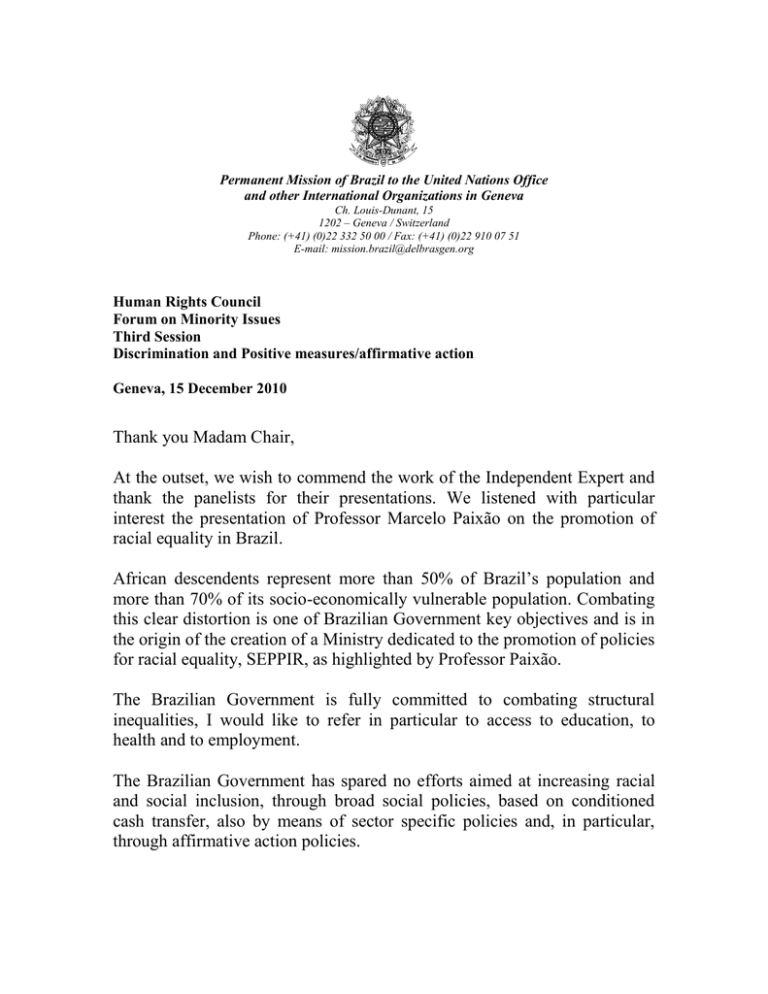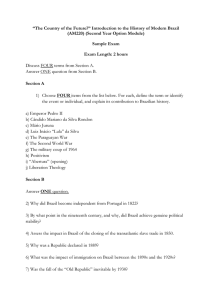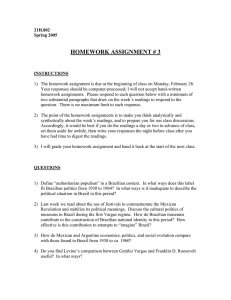Document 17704656
advertisement

Permanent Mission of Brazil to the United Nations Office and other International Organizations in Geneva Ch. Louis-Dunant, 15 1202 – Geneva / Switzerland Phone: (+41) (0)22 332 50 00 / Fax: (+41) (0)22 910 07 51 E-mail: mission.brazil@delbrasgen.org Human Rights Council Forum on Minority Issues Third Session Discrimination and Positive measures/affirmative action Geneva, 15 December 2010 Thank you Madam Chair, At the outset, we wish to commend the work of the Independent Expert and thank the panelists for their presentations. We listened with particular interest the presentation of Professor Marcelo Paixão on the promotion of racial equality in Brazil. African descendents represent more than 50% of Brazil’s population and more than 70% of its socio-economically vulnerable population. Combating this clear distortion is one of Brazilian Government key objectives and is in the origin of the creation of a Ministry dedicated to the promotion of policies for racial equality, SEPPIR, as highlighted by Professor Paixão. The Brazilian Government is fully committed to combating structural inequalities, I would like to refer in particular to access to education, to health and to employment. The Brazilian Government has spared no efforts aimed at increasing racial and social inclusion, through broad social policies, based on conditioned cash transfer, also by means of sector specific policies and, in particular, through affirmative action policies. Through a sound macroeconomic policy and through cash transfer programmes, such as “Bolsa Família”, the Brazilian Government made of social inclusion a moral imperative and a strategic goal for the development of the country, with the generation of income and employment. At the level of elementary education, the enrolment ratio of white and black students are roughly the same, however, of those, 20,5% of white students and only 7,7% of black students reach superior education. With the aim of correcting this historical distortion, the Brazilian Government, by means of affirmative action policies, was able to guarantee access to University to more than 350 thousand young afro descendents in the last 5 years. They are also granted scholarships to undergraduate, master's, doctorate, internships, training and professional integration in an international environment. In the health area, notwithstanding its universal access, disparities in the quality of treatment remain. Since May 2009, the Brazilian Government has been implementing a national policy for the integral health of African descendent population and has made efforts with a view to guaranteeing egalitarian access to quality public health service and with the specialized required treatments. In the area of Labour, it is worth highlighting the Sector Qualification Plan for African descendents, aimed at building professional capacity through Individual Entrepreneurship Courses in the field of trade and services. The goal is to reach 25 thousand professionals around the country. We would also wish to highlight the promotion of access of Brazilians of African descent to the diplomatic career. For that matter, Brazil’s Ministry of External Relations has been providing grants to young Brazilian’s of African descent for the preparation for the diplomatic career entry exams. This programme has already proven its success. Madam Chair, Allow me to make some brief remarks on the recent enactment of Brazil’s “Statute of Racial Equality". Last July, President Lula enacted Law number 12.288, establishing the "Statute of Racial Equality". This landmark decision had the aim of reinforcing the obligation of the State and society to guarantee equal opportunities to Brazil’s African descendent population. The Statute encompasses a broad range of measures, including affirmative actions, for both public and private sectors in areas such as health, education, culture, religion, Quilombola communities, sports, leisure, access to land, capacity building, cybercrimes and housing. The Statute also establishes the National System of Racial Equality Promotion (SINAPIR). Besides the fact that the Statute is legally enforceable before domestic courts, it establishes Permanent Racial Equality Ombudsman Offices countrywide in order to give further implementation to the Statute. To conclude, as President Lula said during the Statute's enactment ceremony, and I quote: "the Statute reinforces what was already established in the Constitution - to turn Brazil into a truly democratic Republic, where all, without any distinction, are treated in equal conditions". Thank you Madam Chair.



